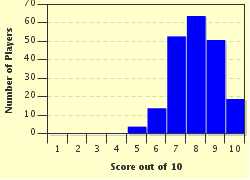Quiz Answer Key and Fun Facts
1. "Bright as a button" indicates someone being bright, intelligent and smart. What is believed to be the origin of this idiom?
2. "Playing by _____" is an idiom that has its origins in music, especially concerning playing music without any score?
3. "Head in the clouds" gives the impression that someone is not grounded in reality and therefore dreaming and unrealistic. What idiom would be the opposite?
4. "Turn a blind eye" comes from Admiral Nelson placing a telescope to his blind eye so that he was unable to see his commander's orders. Is this true or false?
5. This idiom is used when someone criticises another when they, themselves, are guilty of it. What idiom is it?
6. There are a number of idioms that mention the moon. Which moon idiom means something that does not to happen very often?
7. We have all heard of "mad as a hatter" and know it either comes from the mercury used in hat manufacturing or from "Alice in Wonderland". Where does the expression "mad as a March hare" come from?
8. What profession does the expression "knowing the ropes" stem from?
9. What expression is attributed to Winston Churchill (through an American newspaper)?
10. Which Biblical idiom relates to an emblem of peace?
Source: Author
ClaudiaCat
This quiz was reviewed by FunTrivia editor
looney_tunes before going online.
Any errors found in FunTrivia content are routinely corrected through our feedback system.


